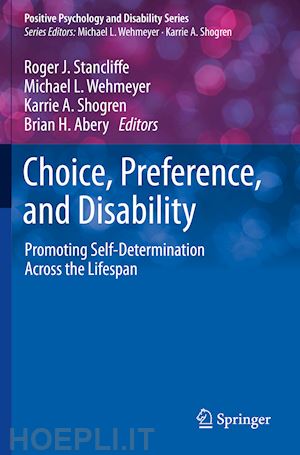
Questo prodotto usufruisce delle SPEDIZIONI GRATIS
selezionando l'opzione Corriere Veloce in fase di ordine.
Pagabile anche con Carta della cultura giovani e del merito, 18App Bonus Cultura e Carta del Docente
This book examines choice and preference in the lives of people with disability, focusing on people with intellectual and developmental disabilities. It provides an overview of choice and examines foundational concepts related to choice and preference, including self-determination and supported decision making. Chapters examine a range of critical service and policy issues, such as guardianship, individualized funding, the health care system, and the situation regarding choices for people with disability in international contexts. In addition, chapters explore issues ranging from the development of preference and choice in childhood to choices in older age and end of life matters. It provides in-depth analysis of particular choices faced at different points across the lifespan. The book concludes with implications for policy and practice.
Topics featured in this book include:
Choice, Preference, and Disability is an essential resource for researchers, professors, clinicians, therapists, and other professionals as well as graduate students in the fields of developmental and positive psychology, rehabilitation, social work, special education, occupational, speech and language therapy, public health, and healthcare policy.
Roger J. Stancliffe, PhD FAAIDD FIASSIDD is Professor of Intellectual Disability at the University of Sydney’s Centre for Disability Research and Policy. He has an ongoing 25-year affiliation with the Research and Training Center on Community Living at the University of Minnesota. His applied research focuses on making a difference in the everyday lives of people with intellectual and developmental disability, ranging from research on transition to work to studies on ageing. His interests include participation, choice, self-determination, support, and the operation of service systems. He has published extensively and has presented papers at research conferences in five continents. Professor Stancliffe edited the Journal of Intellectual & Developmental Disability from 2003 to 2008. He is the recipient of the 2011 AAIDD Research Award. His most recent book is Transition to retirement: A guide to inclusive practice.
Michael L. Wehmeyer, PhD is the Ross and Marianna Beach Distinguished Professor in Special Education and Chair, Department of Special Education, University of Kansas. He is also Director and Senior Scientist at the Beach Center on Disability, also at KU. His research focuses on issues pertaining to self-determination, the application of positive psychology to the disability context, applied cognitive technologies, and the education of learners with intellectual disability and extensive support needs. He is a Fellow of the American Psychological Association (Division on Intellectual and Developmental Disabilities), the International Association for the Scientific Study of Intellectual and Developmental Disabilities, and the American Association on Intellectual and Developmental Disabilities, the latter of which he is also a past-president. He is currently the President of the Council for Exceptional Children’s Division on Autism and Developmental Disabilities.
Karrie A.Shogren, PhD is a Professor in the Department of Special Education, Senior Scientist in the Life Span Institute, and Director of the Kansas University Center on Developmental Disabilities. Dr. Shogren's research focuses on self-determination and systems of support for people with disabilities and she has a specific interest in the multiple, nested contextual factors that impact outcomes. Dr. Shogren has published over 130 articles in peer-reviewed journals, is the author or co-author of 10 books, and is one of the co-authors of Intellectual Disability: Definition, Classification, and Systems of Support, the 11th Edition of the American Association on Intellectual and Developmental Disabilities' seminal definition of intellectual disability as well as the Supports Intensity Scale-Children’s and Adult Version. Dr. Shogren is also the lead author of the Self-Determination Inventory System, a newly development measurement system for self-determination. Dr. Shogrenhas received grant funding from several sources, including the Institute of Education Sciences (IES) and National Institute on Disability, Independent Living, and Rehabilitation Research (NIDILRR). Dr. Shogren is co-Editor of Remedial and Special Education.
Brian Abery, PhD is a Senior Research Associate at the University of Minnesota’s Institute on Community Integration as well as an adjunct faculty member within the Special Education Program. He serves as the Co-director of the Institute’s Research and Training Center on HCBS Outcome Measurement and Global Disability Rights and Inclusion Program. Dr. Abery holds a doctorate in Educational Psychology and has been a Principal Investigator and Director of numerous government and foundation funded projects designed to promote the self-determination, health care coordination, social inclusion, and quality of life of persons with disabilities. He has published journal articles, technical reports, and products on self-determination, inclusive education, and residential services, as well as presented at numerous national and international conferences. He is co-author of the tripartite ecological model of self-determination as well as several instruments designed to assess the self-determination of children, youth, and adults with disabilities.










Il sito utilizza cookie ed altri strumenti di tracciamento che raccolgono informazioni dal dispositivo dell’utente. Oltre ai cookie tecnici ed analitici aggregati, strettamente necessari per il funzionamento di questo sito web, previo consenso dell’utente possono essere installati cookie di profilazione e marketing e cookie dei social media. Cliccando su “Accetto tutti i cookie” saranno attivate tutte le categorie di cookie. Per accettare solo deterninate categorie di cookie, cliccare invece su “Impostazioni cookie”. Chiudendo il banner o continuando a navigare saranno installati solo cookie tecnici. Per maggiori dettagli, consultare la Cookie Policy.